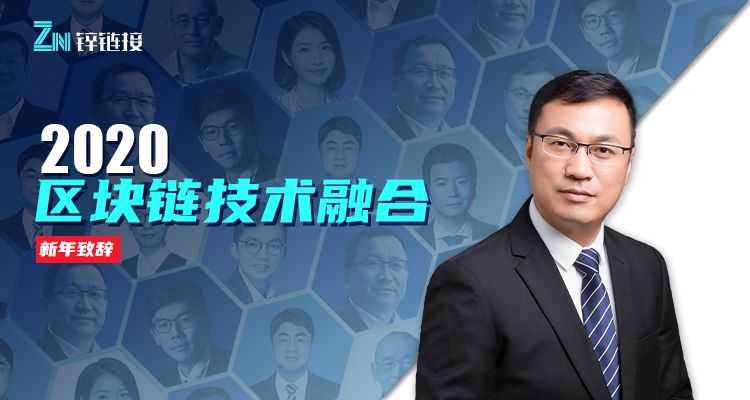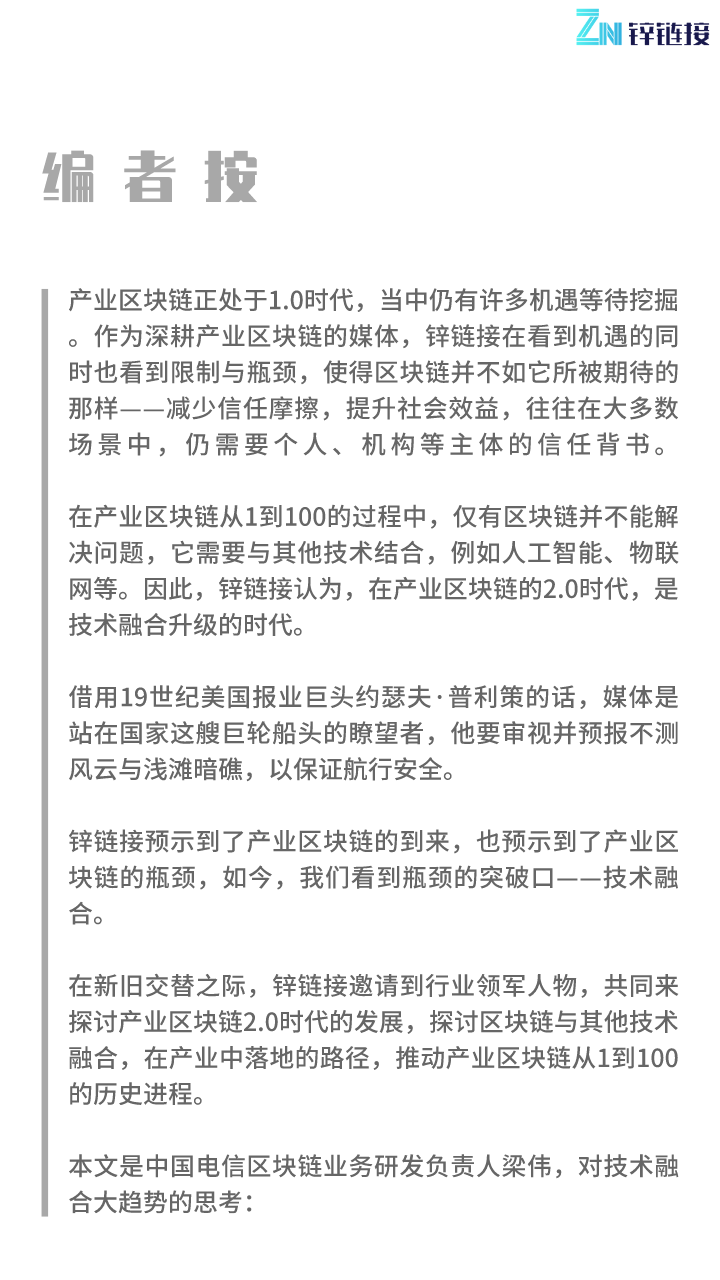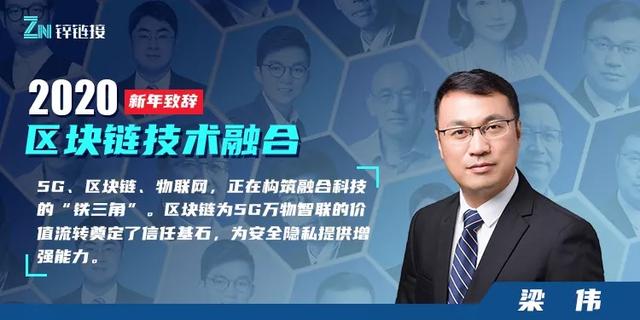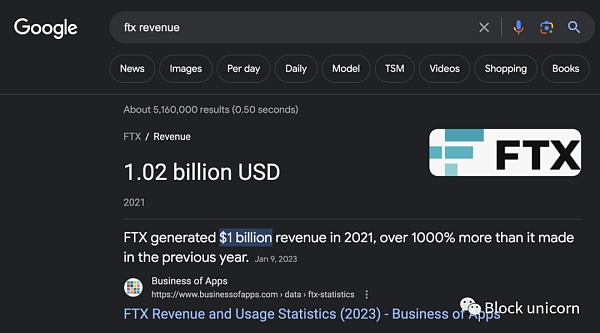China Telecom Liang Wei: 5G, Blockchain, Internet of Things, Building an "Iron Triangle" of Fusion Technology

By Liang Wei
Editor / Zhao Xuejiao
This article first appeared on WeChat public account zinc link (ID: xinlianjie-), pay attention to the public account, and explore the value of the industrial blockchain with us. If you need to reprint the article, please apply for white list on WeChat.
- Plasma's Fall: Who killed Plasma?
- Perspectives | ETH, trillions of dollars worth of economic bandwidth
- Oil giant Saudi Aramco invests $ 5 million in blockchain company Vakt, blockchain becomes an important part of the oil trade

Today, the development of the digital industry is driven by the convergence of multiple technologies.
5G is a "big channel". It provides high-speed, low-latency, and massive-access network capabilities through core technologies such as high-frequency communications, large-scale antennas, and ultra-dense networking, providing a foundation for the interconnection of all things.
The Internet of Things provides "multi-touch", which realizes the digital connection and perception of the physical world, so that everything has a digital twin in the mirrored world.
The blockchain improves the "production relationship" and lays the foundation of trust for value transmission and large-scale collaboration in the era of the Internet of Everything.
5G, blockchain, and the Internet of Things are building an "iron triangle" that integrates technology. The triangle architecture is the most stable. The technology at the three vertices of the "iron triangle", on the one hand, develops as an independent technology, on the other, the breakthrough of each vertex will strengthen the other two vertices.

5G is for the Internet of Things, which can allow the Internet of Things to break through the limitations of existing applications and expand into vertical subdivision scenarios such as industrial manufacturing and intelligent transportation;
Blockchain is 5G, and it can help value exchange between people, people and things, things and things;
The Internet of Things is to the blockchain, and it can maximize the connotation of the sharing economy by strengthening security and privacy.
I. Laying the cornerstone of trust and enhancing security and privacy
The integration of 5G and blockchain will present two characteristics:
First, the blockchain has laid the foundation of trust for the value transfer of 5G Smart Connect. 5G will give birth to a sharing economy with zero marginal cost.Blockchain will help realize the real rights of physical space assets, and sensitively measure the price of the sharing economy on this basis, allowing the use of equity to flow at high speed without friction. Power promotes the flow of all things.
Second, the blockchain provides enhanced capabilities for the security and privacy of 5G Everything Connect. 5G will bring about a geometric growth in the volume of transactions between people, people and things, things and things, not only magnifying the problems of data falsification, mutual distrust, but also giving existing centralized enablement platforms, Connection management systems and the like pose challenges in processing performance and multi-party collaboration.
The blockchain is based on a variety of security methods such as asymmetric passwords and privacy calculations, which helps protect transaction privacy, trace back historical records, and make the entire IoT system more secure and robust.
Welcoming the age of all things connected
As the leader of the telecommunications working group of the Trusted Blockchain Promotion Plan, the author jointly released the "White Paper on Blockchain Telecommunications Industry Application", sorting out typical blockchain application scenarios in the telecommunications industry.
Scenarios related to 5G convergence technology include:
1) 5G dynamic spectrum management. As a scarce natural resource, wireless spectrum is currently planned using a “static management strategy”. Not only is there a serious shortage, but the utilization rate of licensed spectrum is low.
Based on the blockchain, they can dynamically share their authorized frequency bands, and settle billing based on smart contracts combined with the characteristics of the owner, free time, etc.
2) Co-construction and sharing of 5G. The co-construction and sharing of 5G basic network architecture is a typical collaborative economy, but business processes are complex.
Blockchain technology is expected to optimize processes in terms of bidding and bidding, resource leasing for virtual merchants, service monitoring, clearing and settlement, etc., thereby saving expenses.
3) 5G digital identity. With the application of 5G technology in vertical application scenarios such as smart cities, intelligent transportation, and mobile medicine, every object will be given a secure digital identity and can be verified. All information and behaviors based on this trusted identity are Can be verified and traced.
Smart contracts and value exchange based on this trusted identity are secure and transparent, which is conducive to strengthening collaboration and resolving disputes.
The fusion technology of 5G and blockchain will surely play a positive role in reducing costs, reducing risks, and enhancing security in the coming era of the Internet of Everything.
We will continue to update Blocking; if you have any questions or suggestions, please contact us!
Was this article helpful?
93 out of 132 found this helpful
Related articles
- Observation | Bitcoin is borderless, but pricing power is borderless
- Blockchain is becoming more and more mainstream, what opportunities do ordinary people have?
- Tendermint cancels CEO role, decentralized Cosmos and virgo relationship becomes a mystery
- Chinese New Year Reading Notes | Is Vitalik's Focus on Cryptoeconomics Solved Now?
- Bakkt exchange bitcoin options products had zero trading volume last week
- Is Plasma completely beaten into the cold? Why the Ethereum development community prefers Rollup technology
- Zcash updates mining rewards, founder rewards cancelled





